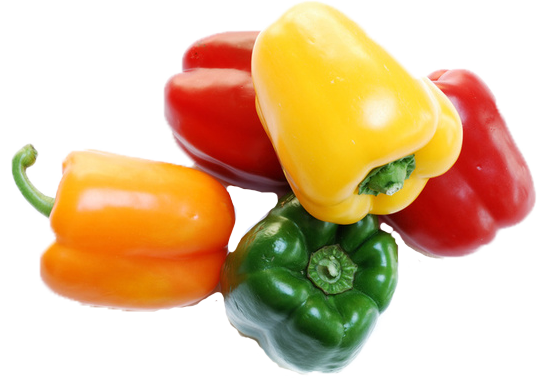|
Bell pepper
contains impressive list of plant nutrients that are known to have disease
preventing and health promoting properties. Unlike other chili peppers, it is
very low in calories and fats. 100 g provide just 31 calories.
Sweet (bell)
pepper contains small levels of health benefiting an alkaloid compound
capsaicin. Early laboratory studies on experimental mammals suggest that
capsaicin has anti-bacterial, anti-carcinogenic, analgesic and anti-diabetic
properties. When used judiciously it also found to reduce triglycerides and LDL
cholesterol levels in obese individuals.
Fresh bell
peppers, red or green, are rich source of vitamin-C. This vitamin is especially
concentrated in red peppers in highest levels. 100 g fresh red pepper provide
about 127.7 mcg or about 213% of RDA. Vitamin-C is a potent water soluble
antioxidant. It is required for the collagen synthesis in the body. Collagen is
the main structural protein in the body required for maintaining the integrity
of blood vessels, skin, organs, and bones. Regular consumption of foods rich in
vitamin C helps body protect from scurvy; develop resistance against infectious
agents (boosts immunity) and scavenge harmful, pro-inflammatory free radicals
from the body.
It also contain
good levels of vitamin-A. 100 g of sweet pepper has 3131 IU or 101% of vitamin
A. In addition, it contains anti-oxidant flavonoids such as α and ß carotenes,
lutein, zeaxanthin, and cryptoxanthin. Together, these antioxidant substances
in capsicum helps to protect body from injurious effects of free radicals
generated during stress and diseases conditions.
Bell pepper has
adequate levels of essential minerals. Some of main minerals in it are iron,
copper, zinc, potassium, manganese, magnesium, and selenium. Manganese is used
by the body as a co-factor for the antioxidant enzyme superoxide dismutase.
Selenium is anti-oxidant micro-mineral that acts as co-factor for enzyme
superoxide dismutase.
Capsicum is also
good in B-complex group of vitamins such as niacin, pyridoxine (vitamin B-6),
riboflavin, and thiamin (vitamin B-1). These vitamins are essential in the
sense that body requires them from external sources to replenish. B-complex
vitamins facilitate cellular metabolism through various enzymatic functions.
Eye Health: Bell peppers contain over 30
different types of carotenoids including alpha-carotene, beta-carotene,
lycopene, lutein, cryptoxanthin and zeaxanthin. Carotenoids are a phytonutrient
family that is responsible for the bright red, yellow and orange colouring in
many fruits and vegetables. Researchers have found that they help heal eyes and ward off eye disease because they absorb damaging blue light as it entersthe eye.
Prevent Cancer: Carotenoids also have powerful antioxidant effects thatcan prevent certain types of cancers. Carotenoids deactivate free radicals,
which are the cell-damaging oxygen atoms that react with other molecules in
your body. Make sure to let bell peppers ripen to maximize the amount of
antioxidant benefits they possess- ripening increases the carotenoid content in
bell peppers. They also have sulphur which helps prevent cancer.
Boosts Immunity: The amount of vitamin C increases
with ripening as well, and bell peppers are full of vitamin C. 1 cup of sliced red
bell peppers gives you 157% of your daily vitamin C content, making them a
great way to stay healthy.
Balances Mood: If you are feeling blue, try to
increase the amount of vitamin B6 you consume. Naturally occurring in bell
peppers, B6 helps your brain produce serotonin and norepinephrine, two
chemicals that affect your mood.
Natural Sleep Aid: Not able to fall asleep at night? Eat
some bell peppers! The vitamin B6 found in bell peppers also aids in melatonin
production, which your body needs to regulate its internal clock.
Weight Loss: Bell peppers are very low in fat and
calories- about 1 gram of fat and 29 calories per cup- which makes them an
ideal snack option, or a great supplement for a main meal. This small amount of
fat is enough to provide a reliable storage for bell pepper’s fat-soluble
nutrients.
Beautiful Skin: Bell peppers contain a solid amount
of Vitamin E, which helps keep skin looking fresh and
young, and hair strong and vibrant.
Lowers Cholesterol: Although bell peppers contain less
capsaicin than their spicier cousins, they do have some. And that’s good news
for those with high cholesterol , because
capsaicin is a nutrient that lowers the levels of bad cholesterol in your
system.
Helps With Pain: The bell pepper relieves chronic pain
in a couple ways. Vitamin C and vitamin K, both found in bell peppers,
have anti-inflammatory properties, which reduces swelling and
protects against osteoporosis. Capsaicin also relieves chronic pain.
Heart Healthy: The anti-inflammatory properties in
bell pepper also lowers inflammation in arteries. That means that bell peppers
help prevent heart disease and diabetes.
|

